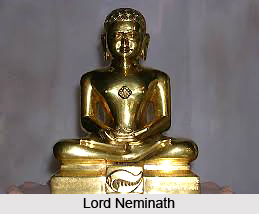 The soul has been formed from Virya, i.e. unlimited power. But the Virya is developed completely only then when the soul is completely free from all the karma-mater. As long as it is not the case, Virya is extremely limited. It does not appear spontaneously, but it is bound to matter; it needs an organ as an accompanying cause to express itself, it needs a medium of body, organ of speech and thinking to be able to be effective.
The soul has been formed from Virya, i.e. unlimited power. But the Virya is developed completely only then when the soul is completely free from all the karma-mater. As long as it is not the case, Virya is extremely limited. It does not appear spontaneously, but it is bound to matter; it needs an organ as an accompanying cause to express itself, it needs a medium of body, organ of speech and thinking to be able to be effective.
This form of the Virya bound to matter is called yoga (activity). The activity of the soul consists in the vibration of the particles in it. Thereby the matter needed for the body, speech and thinking organs are attracted to it, transformed into the entities of these organs and they are again expelled. Since Yoga carries matter constantly into the soul, it is the main cause for receiving new Karmas.
Soul is activated in three ways; it is expressed in thoughts, words, and works and therefore it is conditioned by the thinking organ, speech organ or the body.
Application of the thinking-organ (Mano-yoga) is of 4 types: true (satya), when it is directed to that is true and false (asatya), when it is directed to something that is false; it is "true and false" (satyamrsa) when, what is thought, is both true and false, e.g. in an Asoka-forest in which there are also other trees besides the Ashoka-trees, and "neither true or false" (asatyamrsa), when, what is thought, is beyond the sphere of what is true and false.
The application of the organ of speech (Vak-yoga) is divided into the same 4 sub-types.
Application of the bodies (Kaya-yoga) is of 7 types depending upon whether one has to deal with the one of earthly body, body of metamorphosis, transference or Karma, or the one where two bodies work together. Application of the fiery body is not especially counted, because it is constantly connected with the Karma-body. The activity is the least among the lowest living beings; it increases with an increasing organization. Also the variety of activity grows with the class of the being; the development, fine Jiva with only one sense has only the activity of the earthly body, whereas all 15 Yogas can appear among the thinking beings which have five senses.
Application of the body and of the organs of speech and thinking has to be regularized to check the connection with the bad Karma-types. Once the condition of saintless has been attained by constant self-training, first the crudest and then the finer application of the body, speech thinking can be eliminated. The saint thus become Ayogi-kevali and now possesses eternally infinite virya which is bound to no organ and which is completely withdrawn from the influx of matter.












